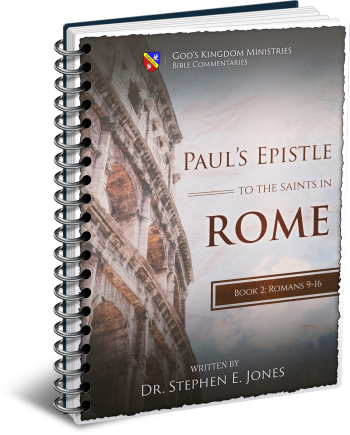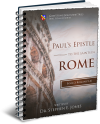Latest Posts
View the latest posts in an easy-to-read list format, with filtering options.

This is the completion of the two volume set of our study in the Book of Romans. This is Volume 2 which covers chapters 9 through 16 and the completion of the revelation of God's Love through Paul in His epistle to the Romans.
Category - Bible Commentaries

Paul says in Romans 13:8-10,
8 Owe nothing to anyone except to love one another; for he who loves his neighbor has fulfilled the law. 9 For this, "You shall not commit adultery, You shall not murder, You shall not steal, You shall not covet," and if there is any other commandment, it is summed up in this saying, "You shall love your neighbor as yourself." 10 Love does no wrong to a neighbor; love therefore is the fulfillment of the law.
All of God's commandments tell us to be conformed to the mind, will, and character of God. God is love; therefore, one cannot claim to love without being obedient to the Law. If a man commits adultery, how can he claim to love his neighbor (in the way that conforms to the mind of God)? If a man steals, how can he claim to love his neighbor?
Love is a summary of the Law, not a substitute for it. Many Christians today have been taught that the Law is largely the opposite of Love, that the Law promotes vengeance and harsh judgment upon men which no Christian in their right mind would want to perform. The irony is that the Law's worst penalty is death, while many of these same Christians teach that this God of Love will torture unbelievers for eternity.
The Law of God is very merciful; it is only the laws of men (including Church law) that are harsh and unmerciful.
Paul says in verse 8 above, "Owe nothing to anyone except to love one another." This was not meant to prohibit a man from borrowing money. Paul assumed that we understood the principle that all sin was to be reckoned as a debt. If I steal from my neighbor, I owe him at least double restitution, according to biblical Law. So to "owe nothing to anyone" means to never steal from my neighbor, never murder him or even attack him, never commit adultery, never covet his possessions.
In this way, I will never be in his debt.
Paul continues,
11 And this do, knowing the time, that it is already the hour for you to awaken from sleep; for now salvation is nearer to us than when we believed.
Paul was engaging in a play on words, because the Hebrew word for "salvation" is Yeshua, which is Jesus' Hebrew name. He was speaking, therefore, of the coming of Christ. He was not indicating, as some have taught, that we should work harder to obtain salvation. He was not saying that when we first believed, salvation was still far from us, but it is now nearer, due to all the good works we have done or that our faith has grown to the point where we are now nearly saved.
No, rather, Paul was telling us that the coming of Christ was more imminent than in the past.
12 The night is almost gone, and the day is at hand. Let us therefore lay aside the deeds of darkness and put on the armor of light.
Paul seemed to think that the second coming of Christ was imminent. As he contemplated the coming destruction of Jerusalem, he was probably unaware that it would require another destruction of Jerusalem to complete the prophecies of Jeremiah and Isaiah. In Paul's day, apart from some specific revelation, it was hardly possible to know that Jerusalem would be rebuilt in the years after 70 A.D., leaving Jer. 19:11 to be fulfilled in the distant future.
In 1 Thess. 4:16-18 Paul speaks of the second coming and immediately follows up with statements about sudden "destruction" (5:3). His advice is similar to Romans 13:12, for he says in 1 Thess. 5:6-8,
6 so then let us not sleep as others do, but let us be alert and sober. 7 For those who sleep do their sleeping at night, and those who get drunk get drunk at night. 8 But since we are of the day, let us be sober, having put on the breastplate of faith and love, and as a helmet, the hope of salvation.
This idea of living in the daylight rather than in the dark of night is a common metaphor in Scripture. The "night" in Rom. 13:12 (above) is the time prior to Christ's coming, but we are always to be the children of light, putting on the armor of light and laying aside the works of darkness. We are like watchmen in the night, called to be vigilant and sober, so that the sudden destruction does not take us by surprise.
Paul's use of the term "day" again shows a subtle play on words. The "day of the Lord" was associated with the time of Jerusalem's destruction, but as believers, we are to be "children of the day" as opposed to the darkness.
The big event that Paul anticipated was the destruction of Jerusalem. It does not appear that he or anyone else was aware that Jerusalem would be destroyed more than once. Hence, they anticipated the soon return of Christ in the first century. In Paul's day, they assumed that Christ's return would coincide with the prophesied "tribulation" that was soon to come upon Jerusalem. However, even the Christians did not anticipate a later destruction of Jerusalem which we now foresee, based upon the same pattern as seen in 586 B.C. and in 70 A.D.)
Prophecy, after all, is a progressive revelation. Prophets are not usually given a complete revelation, but rather, "we know in part and we prophesy in part" (1 Cor. 13:9). For example, when Jerusalem was destroyed by the Babylonians in 586 B.C., Jeremiah understood that the captivity would be just 70 years in length (Jer. 25:11), but Daniel received further revelation that only the iron yoke would last 70 years. The full captivity would be much longer, as there were actually four beast-empires that would be given authority by God to rule the earth. Likewise, the time of the fourth beast would be extended further by the rule of the "little horn" (Dan. 7:8).
Centuries later, John came to see that the "little horn" of Daniel 7:20-22 was to manifest in two distinct phases: (1) the beast from the sea, and (2) the beast from the earth (Rev. 13). Hence, we see a progressive revelation, rather than a complete revelation given to the prophets.
So also is it with Paul. He understood that Jerusalem was to be destroyed, but assumed that the destruction coming soon in his day would be the final one, where the city would never again be rebuilt (Jer. 19:11).
History corrects our views of prophecy, if not corrected by personal revelation itself. When Jerusalem was rebuilt in the second century, it proved that Jer. 19:11 had not yet been fulfilled. It proved that the destruction in 70 A.D. was like the destruction in Jeremiah's day—TEMPORARY and therefore incomplete.
At any rate, even the temporary destruction of Jerusalem of 70 A.D. was enough to motivate the believers then to be vigilant and sober and to put off "the deeds of darkness." All times of tribulation in every age are serious, and the believers must be extra vigilant—even as watchmen on the walls must be more vigilant in times of impending war.
13 Let us behave properly as in the day, not in carousing and drunkenness, not in sexual promiscuity and sensuality, not in strife and jealousy. 14 But put on the Lord Jesus Christ, and make no provision for the flesh in regard to its lusts.
How were believers to behave as children of the day? Paul had given the answer in previous verses. They were to love their neighbors and do no wrong to them. They were to follow God's commandments in regard to their treatment of others. They were not to "join the resistance" against Rome in the coming war, but submit to the authority of the iron beast that God had empowered.
This is the way, Paul tells us, that we are to present our bodies as living sacrifices to God. This is how we are to "be transformed by the renewing of your mind" (Rom. 12:2). We are to recognize the sovereignty of God and that He sets up the governments upon earth (both good and evil) for His purposes. There is much evil in the world and in the governments of men, but we are not to try to overcome this by "evil" but to "overcome evil with good" (Rom. 12:21).